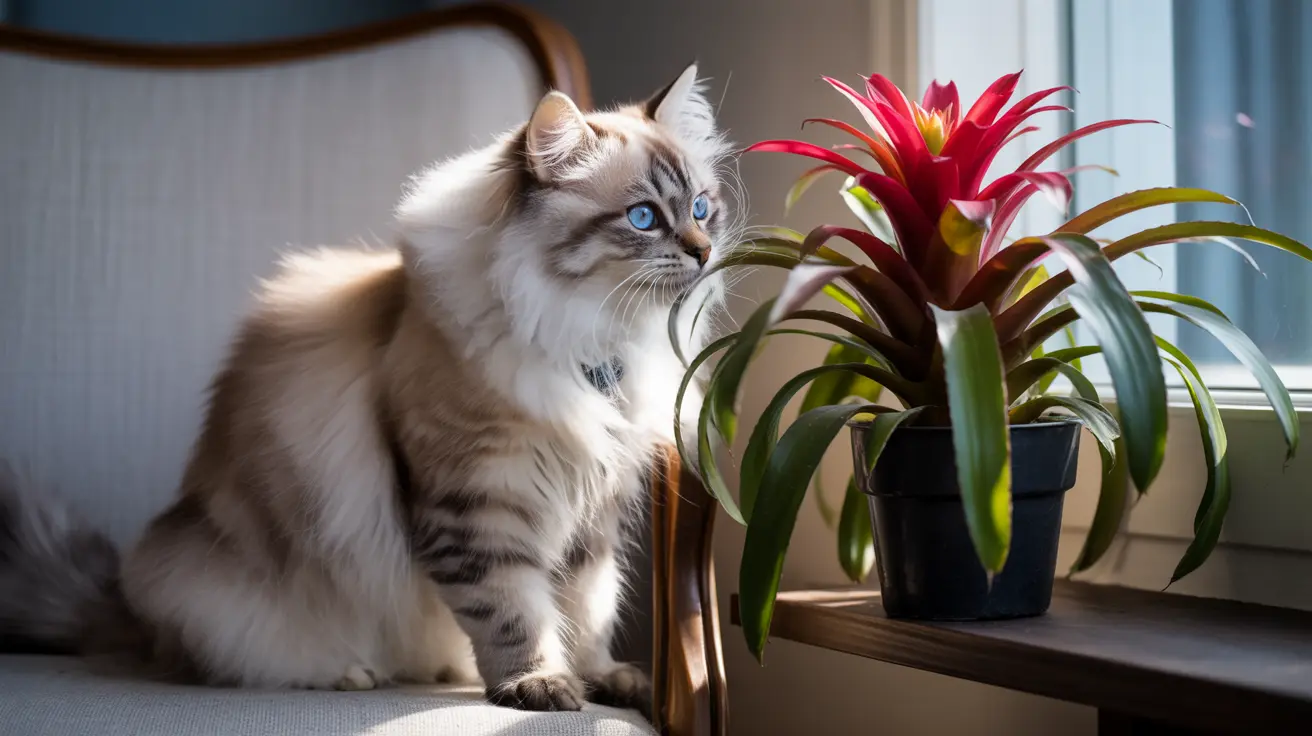Introduction
If you're a cat parent who loves adding tropical flair to your home with houseplants, you may have wondered about bromeliad toxicity to cats. These stunning ornamental plants, known for their vibrant colors and exotic appearance, are increasingly popular in modern homes. The good news is that bromeliads are considered non-toxic to cats, making them a safe choice for pet-friendly households.
However, understanding the complete picture of bromeliad safety and knowing how to prevent potential issues can help ensure both your feline friend and your plants thrive together harmoniously. Let's explore everything you need to know about bromeliads and their relationship with cats.
Understanding Bromeliad Safety for Cats
Bromeliads belong to the Bromeliaceae family, which includes thousands of species, from the familiar pineapple plant to decorative air plants. The ASPCA officially lists bromeliads as non-toxic to both cats and dogs, making them one of the safer choices for pet households.
While these plants don't contain harmful toxins, it's important to note that any plant material, when consumed in large quantities, can cause mild digestive upset in cats. This isn't due to toxicity but rather the plant's fibrous nature.
Common Bromeliad Varieties Safe for Cat Households
Several popular bromeliad varieties are commonly kept as houseplants, all of which are considered safe around cats:
- Guzmania: Known for their bright, long-lasting flower bracts
- Tillandsia (Air Plants): Perfect for hanging displays
- Neoregelia (Blushing Bromeliad): Features striking colored foliage
- Cryptanthus (Earth Stars): Low-growing plants with distinctive patterns
- Ananas (Ornamental Pineapple): Decorative and unique conversation pieces
Potential Health Concerns and Symptoms
While bromeliads aren't toxic, cat owners should still be aware of potential issues that might arise from plant interaction:
Mild Symptoms That May Occur:
- Temporary digestive upset
- Minor vomiting
- Short-term diarrhea
- Decreased appetite
These symptoms typically only occur if a cat consumes large amounts of plant material and usually resolve on their own within 24 hours.
Prevention and Safe Plant Placement
To maintain a harmonious environment for both your cats and bromeliads:
- Position plants strategically out of easy reach
- Create dedicated plant areas using hanging baskets or high shelves
- Provide cat-friendly alternatives like cat grass
- Use pet-safe deterrent sprays around plant areas
- Ensure proper enrichment to prevent boredom-based plant chewing
Monitoring Your Cat's Plant Interactions
Even with non-toxic plants, it's important to observe your cat's behavior around bromeliads. Watch for excessive plant chewing or any unusual symptoms. If your cat shows persistent interest in eating plants, consider providing additional enrichment activities or consulting with your veterinarian about potential dietary needs.
Frequently Asked Questions
Are bromeliads toxic to cats if ingested?
No, bromeliads are not toxic to cats. They are officially listed as non-toxic by the ASPCA and are safe to keep in homes with cats.
What symptoms might a cat show after eating bromeliad leaves or flowers?
While not toxic, cats may experience mild digestive upset, including temporary vomiting or diarrhea, if they consume large amounts of bromeliad plant material.
Which common types of bromeliads are safe to have around cats?
All common bromeliad varieties, including Guzmania, Tillandsia, Neoregelia, Cryptanthus, and ornamental pineapple plants, are safe to have around cats.
How can I prevent my cat from chewing on bromeliad plants?
Place plants in hanging baskets or on high shelves, use pet-safe deterrent sprays, provide alternative plants like cat grass, and ensure your cat has plenty of enrichment activities.
What should I do if my cat shows signs of upset stomach after eating a bromeliad?
Monitor your cat closely. If symptoms are mild and improve within 24 hours, no action is typically needed. For persistent or severe symptoms, consult your veterinarian.
Conclusion
Bromeliads offer cat owners a beautiful, safe option for indoor gardening. While these plants aren't toxic to cats, responsible plant placement and monitoring your pet's behavior around them remains important. With proper precautions, both your feline friend and your bromeliads can coexist beautifully in your home.






